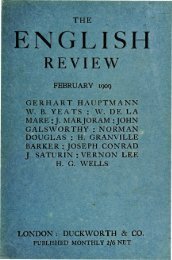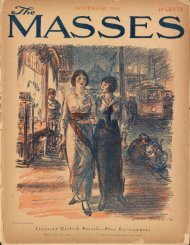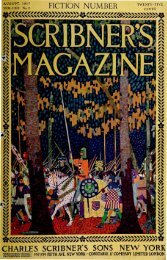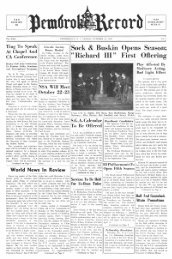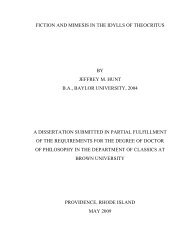View PDF - Brown University Library
View PDF - Brown University Library
View PDF - Brown University Library
- No tags were found...
Create successful ePaper yourself
Turn your PDF publications into a flip-book with our unique Google optimized e-Paper software.
62 Mr. Boyleset you on the trail so hot-footed? It'sas if you had personal reasons for seeingthe cause through."Mr. Boyle's face of sunshine set intogrimness. " 'Tis reason Oi have, and 'tispersonal reason, sor-r. An' Oi'm hopin't' see th' cause through, as yez said.Shure Oi am 'twill be in your day an'moine. An' whot Michael Boyle is ablet' do t' help—'twill be done."There was stillness a moment in thebig room; one felt the power of a personalityin earnest. Then Huntingtonthe scoffer spoke casually." I suppose you're going to march in theparade Saturday?" he asked, smiling.Mr. Boyle did not smile. "Oi am,"he answered seriously. "An' me woife.An'—an' maybe—me gyur-rl." He wasaware suddenly that the note was pitchedin a minor key; instantly he was restless;instantly his Irish tact shifted the tone." 'Tis a ralief t' me," he stated cheerfully,"thot yez niver gits toird shtudyin' th'law. F'r shure," said Mr. Boyle, " there'sa lot of ut to shtudy, an' 'tis a fear-rfulshtudy—an' exthry-ardin'ry shtudy—an'I must now be windin' me clocks." Witha shuffle of light feet he broke into music." 'Oi've seen th' weddin' and th' wake,Th' patron an' th' fair,' "sang Mr. Boyle, and passed out singingit; far down the corridor, as he turned acorner, they heard him change merrily tothe perfect inconsequence of" 'Two little maids in blueTra-la-la—Tra-la-la !'"And the Law Record board lifted up itsheart to a rarefied atmosphere of purereason through a stratum of atmosphereleft clear and pleasant by Mr. Boyle'samiable exit.All but Richard Battle. Do what hewould, he could not sustain himself onaccustomed heights. He could not shakeoff a sense that incompatible facts werehis affair to adjust. The girl whom he hadloved that first day only a month ago,whom he had loved more, with all that wasin him, including his judgment, each timehe had seen her since that day; the girl whoseemed to him everything which he haddreamed of a girl one day being; the girlwhom he had thought, with a deep-goingjoy, was the sort whom his mother wouldlove, too—this girl was one fact. Theother fact which he tried to adjust withher and could not was that she was asuffragist. A suffragette he had called it,because that word carries a man's contemptbetter than the simpler one. Asuffragette ! He knew his mother's prejudices.He knew the sentiment in theold Southern city. He knew his own dislikeof the sort of woman that word hadalways described to him. Yet he was alawyer. What was that which Alan hadsaid a few minutes back: "The law ismade to uphold light and truth." If hewere mistaken, if this cause which wasflooding the country should be carryingthose things, light and truth? Whatthen? How might he honestly stand ona foundation of prejudice if that ocean—light and truth—swept over him? Butwas it truth and light—the cause? Hehad not found answers ready to the rushingsentences of the girl that evening; buthe was not convinced; he could not yetbelieve that women—most women—objectedto being held in tutelage, kindlytutelage. Was it true that to vote—three or four times a year, as the girl hadsaid—would not automatically changethe gracious womenfolk whom he lovedinto strange masculine monsters? Hadthe time arrived in civilization when awoman who was a graduate of a seriousuniversity course, like the girl, should beconsidered as competent to know aboutgovernments as a stable-boy?Playing havoc with the rule againstperpetuities, these upheaving questionssplit in varying cleavages through thevirgin soil of Richard Battle's mind.Virgin soil, for never before had thatmind given an inch of room to anythingbut whole-souled repugnance toward theentire business. And forever the imageof his mother, of her surprise, her highbredamazement at his doubts, came like arefrain. Whatever might happen, therewas that finished personality, eternallyon the side of conservatism, to be reckonedwith. Yet one might not be dishonest.If this thing was so, if by someunbelievable logic this creed which revoltedhim meant justice, might oneresist ? Must not one follow justice if theskies fell ? Could one, possibly, help to do



